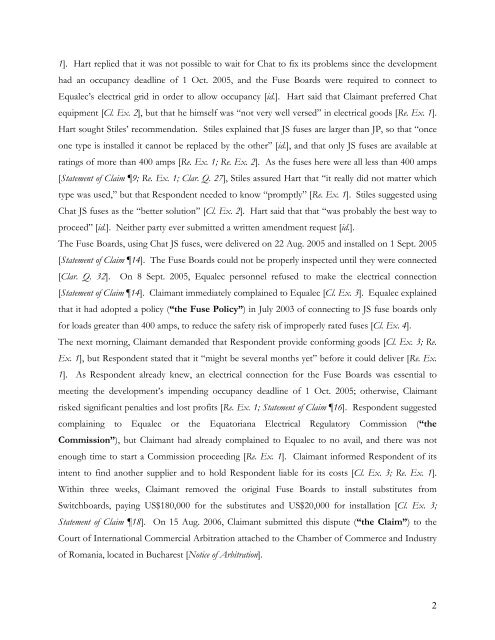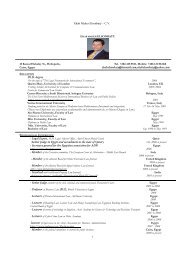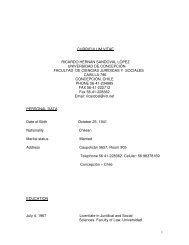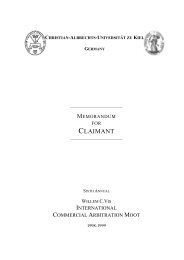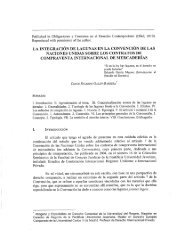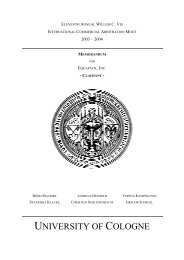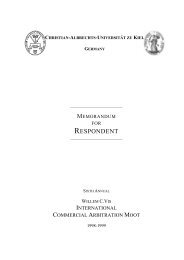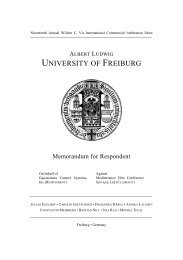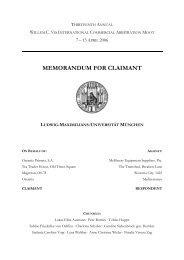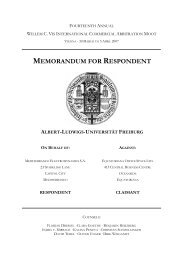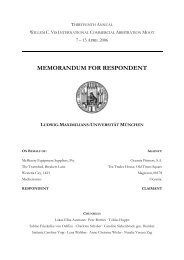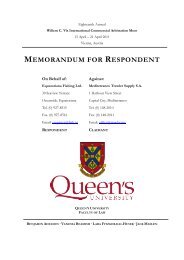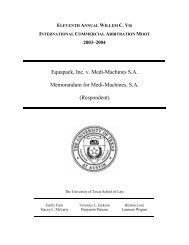CLAIMANT 0800 FINAL 12072006
CLAIMANT 0800 FINAL 12072006
CLAIMANT 0800 FINAL 12072006
Create successful ePaper yourself
Turn your PDF publications into a flip-book with our unique Google optimized e-Paper software.
1]. Hart replied that it was not possible to wait for Chat to fix its problems since the development<br />
had an occupancy deadline of 1 Oct. 2005, and the Fuse Boards were required to connect to<br />
Equalec’s electrical grid in order to allow occupancy [id.]. Hart said that Claimant preferred Chat<br />
equipment [Cl. Ex. 2], but that he himself was “not very well versed” in electrical goods [Re. Ex. 1].<br />
Hart sought Stiles’ recommendation. Stiles explained that JS fuses are larger than JP, so that “once<br />
one type is installed it cannot be replaced by the other” [id.], and that only JS fuses are available at<br />
ratings of more than 400 amps [Re. Ex. 1; Re. Ex. 2]. As the fuses here were all less than 400 amps<br />
[Statement of Claim 9; Re. Ex. 1; Clar. Q. 27], Stiles assured Hart that “it really did not matter which<br />
type was used,” but that Respondent needed to know “promptly” [Re. Ex. 1]. Stiles suggested using<br />
Chat JS fuses as the “better solution” [Cl. Ex. 2]. Hart said that that “was probably the best way to<br />
proceed” [id.]. Neither party ever submitted a written amendment request [id.].<br />
The Fuse Boards, using Chat JS fuses, were delivered on 22 Aug. 2005 and installed on 1 Sept. 2005<br />
[Statement of Claim 14]. The Fuse Boards could not be properly inspected until they were connected<br />
[Clar. Q. 32]. On 8 Sept. 2005, Equalec personnel refused to make the electrical connection<br />
[Statement of Claim 14]. Claimant immediately complained to Equalec [Cl. Ex. 3]. Equalec explained<br />
that it had adopted a policy (“the Fuse Policy”) in July 2003 of connecting to JS fuse boards only<br />
for loads greater than 400 amps, to reduce the safety risk of improperly rated fuses [Cl. Ex. 4].<br />
The next morning, Claimant demanded that Respondent provide conforming goods [Cl. Ex. 3; Re.<br />
Ex. 1], but Respondent stated that it “might be several months yet” before it could deliver [Re. Ex.<br />
1]. As Respondent already knew, an electrical connection for the Fuse Boards was essential to<br />
meeting the development’s impending occupancy deadline of 1 Oct. 2005; otherwise, Claimant<br />
risked significant penalties and lost profits [Re. Ex. 1; Statement of Claim 16]. Respondent suggested<br />
complaining to Equalec or the Equatoriana Electrical Regulatory Commission (“the<br />
Commission”), but Claimant had already complained to Equalec to no avail, and there was not<br />
enough time to start a Commission proceeding [Re. Ex. 1]. Claimant informed Respondent of its<br />
intent to find another supplier and to hold Respondent liable for its costs [Cl. Ex. 3; Re. Ex. 1].<br />
Within three weeks, Claimant removed the original Fuse Boards to install substitutes from<br />
Switchboards, paying US$180,000 for the substitutes and US$20,000 for installation [Cl. Ex. 3;<br />
Statement of Claim 18]. On 15 Aug. 2006, Claimant submitted this dispute (“the Claim”) to the<br />
Court of International Commercial Arbitration attached to the Chamber of Commerce and Industry<br />
of Romania, located in Bucharest [Notice of Arbitration].<br />
2


